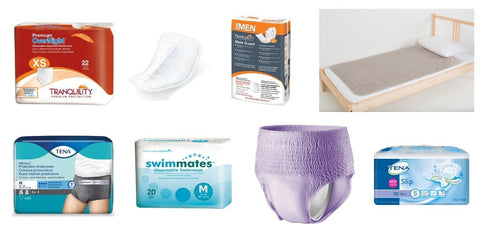Myth or Fact? Truths about bladder control

The truth about bladder control
According to the Canadian Continence Foundation, urinary incontinence affects over 3.3 million Canadians, but it is rarely talked about."Bladder is a word that people used to not even say; they'd laugh when it came out of their mouths," says Nancy Muller, PhD, executive director of the National Association for Continence (NAFC). In recent years, people's responses have improved—slightly.
Instead of waiting 10 years, women now wait about six and a half years to talk to their doctor, Muller says. That's still a long time to live with symptoms. Here, we set the record straight regarding common assumptions about incontinence.
1. Only older people leak
Myth
Although urinary incontinence risk goes up as you age, anyone can experience symptoms at any time. NAFC surveys suggest 1 in 4 women over 18 leak urine involuntarily, and one-third of men and women ages 30 to 70 have lost bladder control at some point as adults.
"My average patient is probably in her mid- to late-40s," says Tom Margolis, MD, a urogynecologist and pelvic surgeon in the California Bay Area; estrogen loss at menopause weakens pelvic muscles, he says. "But I've treated women as young as 20 and as old as 98."
2. Yours is the only leaky bladder
Myth
Urinary incontinence affects 200 million people worldwide, and experts estimate that 3.3 million adult Canadians experience occasional or chronic symptoms. (Of those people, 9 to 13 million have bothersome, severe symptoms, estimates the NAFC.)
Many cases go undiagnosed and untreated, says Muller, not only because of the stigma and embarrassment associated with urinary incontinence, but also because people don't know how to talk to their doctor about the problem.
3. It's normal to leak a little urine
Myth
If incontinence comes on gradually, people often don't think of the leakage as a medical problem. Women tend to associate symptoms with their menstrual period and use feminine hygiene products to control them, says Muller. "They don't see a doctor until overactive bladder kicks in as well, and they're rushing to the toilet and sometimes can't make it in time."
Dr. Margolis agrees that people often downplay the condition. "It's OK to want to have control of certain bodily functions that the rest of us take for granted," he says he tells his patients.
4. Bladder trouble is inevitable with aging or childbirth
Myth
One-third of men and women ages 30 to 70 believe that incontinence is a normal part of aging, according to the NAFC, and a third of women believe that it's due to childbirth.
That's far from the truth, says Muller. Aging and childbirth do increase the risk, but they aren't always related. "I've known plenty of women who have had 9-pound babies delivered vaginally and do not end up incontinent, and plenty of people who are 90 years old and have control over their bladder."
5. Sounds or thoughts can trigger trouble
Fact
It's not only coughing, laughing, or jumping up and down that can cause people to leak urine; about 3 out of 10 people with incontinence have urge incontinence, which is different from stress incontinence.
"The simplest way to think of urge incontinence is as a miscommunication or a failure between the brain and the spinal cord," says Dr. Margolis. A sudden and uncontrollable need to urinate can be brought on, for example, by the sound of running water, drinking a small amount of liquid, or being confronted with a locked door.
6. You should drink as little as possible
Myth
Avoiding liquids completely might seem like the logical way to prevent accidents, but it won't. In fact, drinking plenty of water—in small doses throughout the day—can actually help stop leakage, improve bladder control, and reduce odour.
Get into the habit of sipping water between meals, drinking up to 8 ounces of water with meals, and not having anything to drink two hours before bed. You may also find that avoiding or reducing caffeine, citrus juices, and carbonated beverages helps stop leakage.
7. It's rarely a problem in men
Myth
About 20% to 25% of Americans with incontinence are men, according to NAFC estimates. Men are less likely to talk about it with friends and family, less likely to be diagnosed by a doctor, and more likely to be uninformed about causes and treatments, the NAFC says.
Men can have stress or urge incontinence, and it's often—but not always—related to prostate problems.
An enlarged prostate can put pressure on the urethra, the tube through which urine leaves the body, and can cause frequent urination. Radiation therapy or surgery for prostate cancer can also seriously affect bladder control.
Here are some examples of products that have been designed specifically for bladder leak protection for men:
MyLiberty.Life is proud of its partnership with the Prostate Cancer Foundation BC. We consulted experts to get their recommendations on which products to include in My Liberty's Prostate Care Collection.
8. It's embarrassing but not serious
Myth
"Urinary incontinence, in and of itself, is not going to kill you," says Dr. Margolis. "And it's not going to shorten your life. It will, however, make your life miserable." Fear of an accident (and self-consciousness about odors) can inhibit the desire to have sex, socialize, or leave the house—which can contribute to loneliness and depression.
Complications are also possible: People with severe cases can get skin rashes and irritation. And for the elderly, frequent bathroom trips can up the risk for falls.
9. It's fine to drink only when thirsty
Fact
The old advice to drink 64 ounces of water a day is not necessary, some experts say. About 80% of our intake should come from liquids (including non-water sources), but the other 20% is from food—and it's the total amount that counts.
"Here's my advice: If you're thirsty, or if your lips are dry, drink. If you're not thirsty, don't drink," says Dr. Margolis. "Unless you're somebody who easily gets kidney stones or you're working on a road crew out in the desert, you don't need to drink more than what your body tells you."
10. Men can do Kegels, too
Fact
Women are often told to do Kegel exercises, the act of squeezing the muscles you'd use to stop urinating, but they work for men too. When practiced regularly, they help bladder control.
Regular Kegel exercises can prevent and, in some cases, even reverse incontinence. Do your exercises three times a day, and you could see improvements within a few weeks.
11. Natural therapies don't work
Myth
Medication and surgery aren't your only options. Studies suggest vitamin D and magnesium (either from food or dietary supplements) may both play a role in preventing and improving incontinence.
Kegel exercises and biofeedback can train and strengthen the muscles around the bladder, and there's even been a bit of positive research on acupuncture and hypnotherapy. Maintaining a healthy weight and avoiding smoking, caffeine, and alcohol are also well-documented things that help.
12. You're condemned to adult diapers
Myth
Today’s incontinence protection product range is impressive, including disposable underwear and pads / panty liners, or adult briefs (adult diapers), bed or chair pads, swimwear and even washcloths and skin care.
Good news - we've done the research for you. We’ve picked product brands with outstanding construction, unbeatable absorbency, first-rate odour control, overall capacity to contain leaks and the capability to be good to skin.
13. We've got you covered, Canada
Fact
We've developed lots of resources to help Canadians navigate this world - from articles explaining the difference between incontinence products, or why product absorption capacity matters. Or, have a look at our free guides for
- A Man's Guide to Finding the Right Bladder Leak Products;
- Parents coping with older bed wetters;
- Parents of kids with special needs; and
- to those buying incontinence products for their parents.
- and let us know if you have questions. We're here to help.
- Cindy Clegg




Comments 0